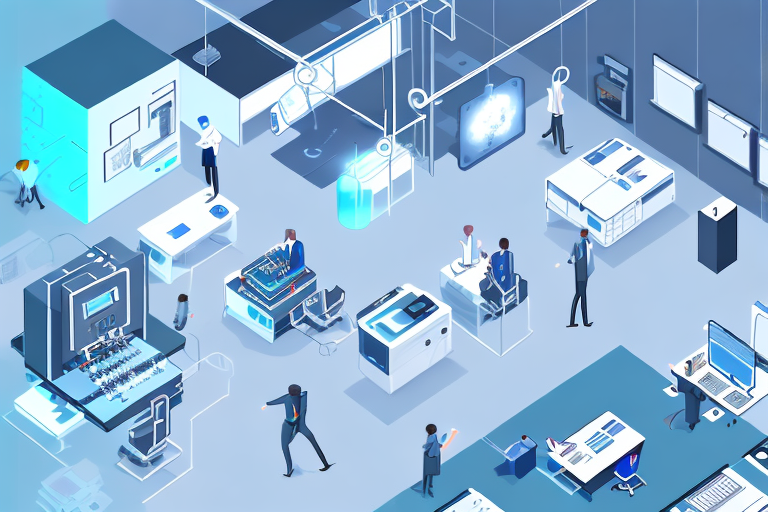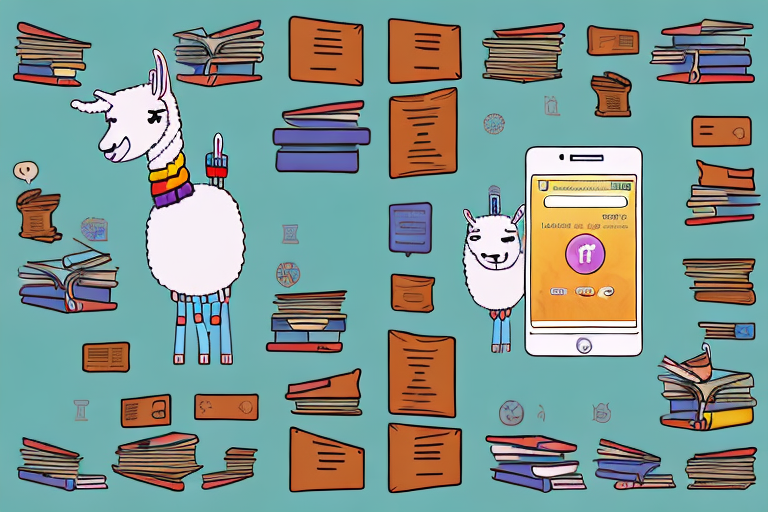In the modern business landscape, companies are constantly seeking ways to optimize their operations and improve efficiencies. One area that has gained significant attention is the use of Artificial Intelligence (AI) in Human Resources (HR) processes. By leveraging the power of AI, organizations can streamline their HR processes, enhance employee engagement, and make informed decisions. This article explores the intersection of AI and HR, highlighting its potential benefits, ethical considerations, and the future of this technology in HR departments.
Understanding the Intersection of Artificial Intelligence and Human Resources
Before delving into the potential of AI in HR, it is essential to define what AI means in the HR context. AI refers to the simulation of human intelligence in machines that are programmed to think and learn like humans. The AI-powered systems and algorithms equipped with vast amounts of data can quickly analyze, interpret, and make predictions, leading to more informed decision-making processes.
With this understanding, it becomes evident that AI can play a crucial role in transforming HR practices. However, it is essential to recognize the role of human resources in modern companies and how AI can enhance their performance and efficiency.
Defining Artificial Intelligence in the HR Context
In the HR context, AI refers to the utilization of intelligent systems, algorithms, and chatbots to automate and facilitate various HR processes. This includes but is not limited to recruitment and selection, employee onboarding and training, performance management, and employee retention strategies.
By integrating AI-driven systems, HR departments can minimize the administrative burden, reduce human error, and focus on strategic tasks that require human judgment and creativity.
The Role of Human Resources in Modern Companies
In the context of modern companies, HR plays a critical role in managing and developing a company’s most valuable asset – its employees. HR professionals are responsible for recruitment, onboarding, training, performance management, and employee engagement, among other essential tasks.
While AI can automate certain HR processes, it is crucial to understand that the human element in HR cannot be completely replaced. HR professionals bring empathy, intuition, and interpersonal skills that are essential when dealing with employees’ diverse needs and concerns.
Furthermore, HR professionals are responsible for creating and maintaining a positive work culture within the organization. They ensure that employees feel valued, supported, and motivated to perform their best. This involves fostering a sense of belonging, promoting diversity and inclusion, and providing opportunities for professional growth and development.
Additionally, HR professionals are at the forefront of managing employee relations and resolving conflicts within the workplace. They act as mediators, ensuring fair and equitable treatment for all employees and addressing any grievances or concerns that may arise.
Moreover, HR professionals are responsible for staying updated on the latest labor laws, regulations, and industry trends. They ensure that the organization complies with legal requirements and implements best practices in all HR processes.
Furthermore, HR professionals are often involved in strategic decision-making processes, collaborating with top management to align HR strategies with the overall business objectives. They provide insights and recommendations based on their understanding of the workforce and the organization’s goals, contributing to the company’s success.
In conclusion, while AI can undoubtedly enhance HR practices by automating certain processes and providing data-driven insights, it is crucial to recognize the irreplaceable role of human resources in modern companies. HR professionals bring a unique set of skills, knowledge, and expertise that cannot be replicated by AI. By leveraging the power of AI alongside human capabilities, organizations can achieve greater efficiency, productivity, and employee satisfaction.
The Potential of AI in Streamlining HR Processes
The potential of AI in HR is vast. Let’s explore two key areas where AI can revolutionize and streamline HR processes – recruitment and selection and employee onboarding and training.
AI in Recruitment and Selection
Recruitment and selection processes can be time-consuming and resource-intensive, particularly in large organizations with a high volume of candidates. AI-powered systems can quickly analyze resumes, identify top candidates, and screen them based on predefined criteria.
Imagine a scenario where an HR professional receives hundreds of resumes for a single job opening. Without AI, they would have to spend hours manually reviewing each resume, looking for relevant skills and qualifications. However, with AI, the process becomes much more efficient. The AI system can scan and analyze resumes in a matter of seconds, highlighting the most suitable candidates based on the job requirements.
By reducing the manual effort involved in filtering resumes and shortlisting candidates, HR professionals can focus on assessing candidates’ interpersonal qualities and cultural fit during the interview process. This can lead to more efficient and effective recruitment outcomes.
Furthermore, AI can also help eliminate bias in the recruitment process. AI systems can be programmed to focus solely on objective criteria, ensuring that candidates are evaluated solely on their qualifications and abilities, rather than factors such as gender, race, or age.
AI in Employee Onboarding and Training
Employee onboarding and training are crucial stages in setting employees up for success within an organization. AI can play a vital role in enhancing these processes by providing personalized onboarding experiences and enabling employees to access relevant training resources.
Imagine a new employee joining a company and being greeted by an AI-powered chatbot. The chatbot can guide them through the onboarding process, providing them with all the necessary information about the company, its policies, and procedures. The chatbot can also answer any questions the employee may have, ensuring a smooth and seamless onboarding experience.
AI-powered chatbots can also provide real-time support to employees during their training period. If an employee is struggling with a particular concept or task, they can simply ask the chatbot for assistance. The chatbot can then provide them with step-by-step instructions or even direct them to relevant training resources.
Moreover, AI can analyze employees’ performance and learning patterns to provide personalized training recommendations. For example, if an employee is excelling in a certain area, the AI system can suggest advanced training modules to further enhance their skills. On the other hand, if an employee is struggling in a particular area, the AI system can recommend additional training resources to help them improve.
This not only enhances the onboarding and training experience but also enables employees to quickly adapt and contribute to the organization’s success.
In conclusion, AI has the potential to revolutionize HR processes in various ways. From streamlining recruitment and selection to enhancing employee onboarding and training, AI can significantly improve efficiency, effectiveness, and overall outcomes in HR. As technology continues to advance, it will be exciting to see how AI further transforms the HR landscape.
Enhancing Employee Engagement and Satisfaction with AI
Besides optimizing HR processes, AI can also enhance employee engagement and satisfaction, leading to higher productivity and retention rates. Let’s explore two key areas where AI can drive employee engagement – performance management and employee retention strategies.
AI in Performance Management
Traditionally, performance management processes have been subjective and reliant on annual reviews. However, with the integration of AI-driven performance management systems, organizations can now provide continuous performance feedback, highlight areas for improvement, and identify top-performing employees in a more efficient and objective manner.
By leveraging real-time data and analytics, HR professionals can have meaningful discussions with employees, recognizing their achievements and providing targeted development opportunities. This data-driven approach not only improves transparency but also motivates employees to strive for excellence, ultimately enhancing overall performance management effectiveness.
Furthermore, AI can help identify patterns and trends in employee performance, allowing organizations to identify training needs and allocate resources accordingly. This proactive approach to performance management ensures that employees receive the necessary support and guidance to reach their full potential, resulting in increased engagement and job satisfaction.
AI in Employee Retention Strategies
Employee retention is vital for the long-term success of any organization. High turnover rates can be costly and disruptive, affecting team dynamics and overall productivity. This is where AI can play a crucial role in identifying early warning signs of employee disengagement or turnover risk.
By analyzing various data points, such as employee feedback, performance data, and sentiment analysis, AI algorithms can detect patterns and indicators of potential disengagement or turnover risks. This allows HR professionals to take proactive measures to address underlying issues and prevent valuable employees from leaving the organization.
One way AI can assist in employee retention is by offering individualized career development plans. By analyzing employee performance data and identifying areas for improvement, AI algorithms can recommend personalized training programs or suggest mentorship opportunities to help employees grow and advance in their careers. This tailored approach not only shows employees that their professional development is valued but also increases their loyalty and commitment to the organization.
In addition, AI can help HR professionals identify potential gaps in employee satisfaction by analyzing data from employee surveys, performance reviews, and other sources. By understanding the factors that contribute to employee dissatisfaction, organizations can implement targeted initiatives to improve the work environment and address any concerns, fostering a positive and supportive culture.
In conclusion, AI has the potential to revolutionize performance management and employee retention strategies. By leveraging real-time data and analytics, organizations can create a more objective and personalized approach to managing employee performance, leading to increased engagement, satisfaction, and ultimately, improved productivity and retention rates.
Ethical Considerations and Challenges in AI-Driven HR
While the benefits of AI in HR are compelling, it is important to address the ethical considerations and challenges associated with its implementation.
Balancing AI Efficiency with Employee Privacy
As AI-driven systems collect and analyze vast amounts of employee data, privacy concerns arise. HR departments must strike a delicate balance between leveraging AI’s efficiency and respecting employee privacy rights.
Implementing clear data protection policies, obtaining informed consent, and ensuring data security are essential steps in maintaining employee trust and upholding privacy standards.
Overcoming Resistance to AI in HR
Introducing AI in HR can sometimes be met with resistance from employees who fear job displacement or invasion of their professional space. Organizations must proactively communicate the advantages of AI, demonstrate how it complements rather than replaces human capabilities, and provide training programs to upskill employees in areas where AI can enhance their performance.
By addressing these concerns transparently and involving employees in the implementation process, organizations can foster acceptance and smooth integration of AI within HR departments.
The Future of AI in Human Resources
Looking ahead, the integration of AI in HR is predicted to continue evolving and shaping HR practices. Let’s explore some predicted trends and what HR departments can do to prepare for AI integration.
Predicted Trends in AI and HR
Experts predict that AI will take on more complex HR tasks in the future, such as predictive workforce planning, sentiment analysis, and talent development strategies. Additionally, AI-powered virtual assistants and chatbots will become more sophisticated, providing seamless support to both HR professionals and employees.
Preparing HR Departments for AI Integration
To harness the potential of AI in HR, organizations must ensure HR professionals have the necessary skills to leverage AI-driven tools effectively. This may include upskilling HR teams in data analysis, interpreting AI-generated insights, and maintaining a proactive approach towards continuous learning.
Furthermore, HR departments need to establish clear AI implementation roadmaps, incorporating change management strategies to ensure successful adoption and acceptance among employees.
Conclusion
The potential of AI in streamlining HR processes, enhancing employee engagement, and addressing challenges is significant. However, it is crucial to strike a balance between the efficiency AI offers and the human element that is essential to HR operations. By understanding the potential benefits, addressing ethical considerations, and proactively preparing for AI integration, organizations can empower their HR departments to leverage AI’s transformative power while fostering a human-centric approach to human resource management.



